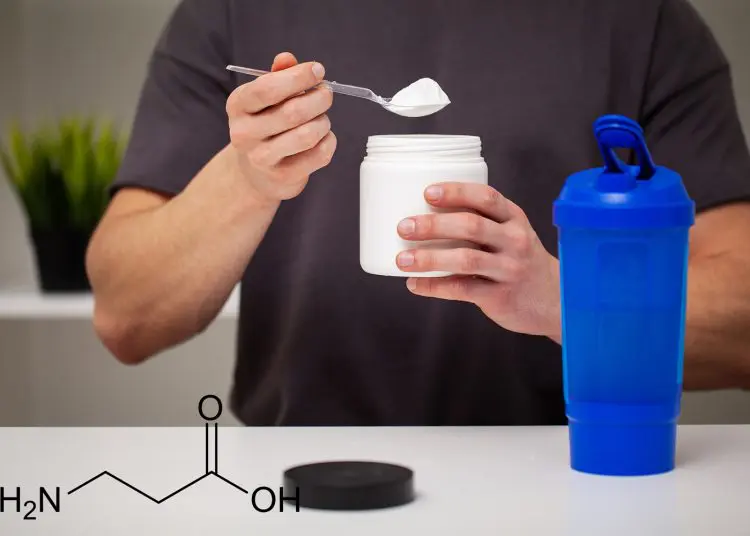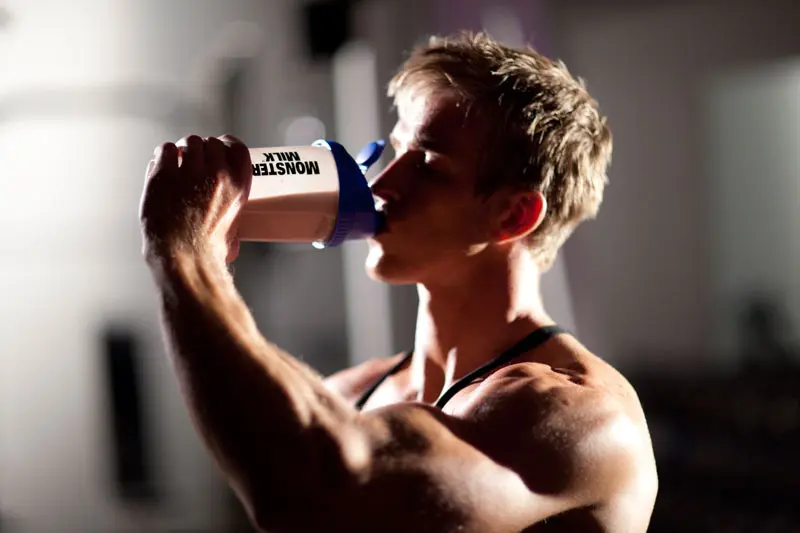Back in the old days before pre-workout supplements, if you wanted more energy, you chugged down a cup of coffee or two, maybe ate some candy or a banana, or just resigned yourself to a less-than-stellar workout and hoped you’d feel more energized next time.
Or, if you were a runner or endurance athlete, you may have shaken the bubbles out of some Coca-Cola and drank that.
Thankfully, sports nutrition has moved on significantly in the last couple of decades, and now, if you need more energy so you can train longer or harder, you can use a pre-workout supplement.
Most pre-workouts are designed to be mixed with water and consumed 15-30 minutes before exercise. They contain various ingredients and raise your energy levels so you can put even more effort into your training.
However, some pre-workouts have noticeable and potentially unwanted side effects, and the most common is tingling or itchy skin, properly called acute paresthesia. This is not a harmful reaction to pre-workout, but not everyone welcomes it, and some even find it uncomfortable or distracting.
In this article, we reveal the pre-workout ingredients that cause itching and what you can do to avoid it.
Culprit #1 – Niacin
A lot of pre-workouts contain large amounts of niacin, also known as vitamin B3. A pre-workout supplement may contain as much as 200% of the recommended daily intake.
Vitamin B3 is found naturally in a wide variety of both animal and plant-based foods, including beef, liver, poultry, eggs, dairy products, fish, nuts, seeds, legumes, avocados, and whole grains. It is also found in fortified cereals and bread. From a dietary point of view, vitamin B3 is abundant, and deficiencies are rare.
Vitamin B3 plays an essential role in the management of your metabolism, the function of your nervous system, and it’s also a valuable antioxidant. Antioxidants provide protection from free radicals, which are unstable electrons that can damage your cells and even your DNA.
Taking large amounts of vitamin B3 can cause something called a “niacin flush,” which causes skin reddening and tingling (1).
While vitamin B3 IS vital for energy metabolism, taking large doses in the form of a pre-workout does not appear to have any performance-boosting effect (2). In fact, manufacturers of pre-workouts may include B3 in their formulations simply because it causes a tingle, which makes users feel that their pre-workout is working.
Compared to other pre-workout ingredients, vitamin B3 is also pretty cheap, which may be why some supplement manufacturers put so much of it in their products.
In short, if your pre-workout contains a lot of vitamin B3/niacin, that is one of the reasons your skin is tingling. However, it’s a tingle without purpose as B3 will not boost your workout performance, and it is doubtful that you need more of this abundant B vitamin in your diet.
The solution? Avoid pre-workouts with large amounts of B3 if you want to remove one of the major causes of skin itchiness and tingling.
Related: 10 Best All-Natural Pre-Workouts Reviewed For 2021
Culprit #2 – Beta-Alanine
Beta-alanine is a common ingredient in many pre-workout supplements. Unlike niacin, it can actually help boost your performance, so its presence makes a lot of sense. Unfortunately, it’s beta-alanine that is also responsible for making your skin itch.
In your body, beta-alanine, which is an amino acid, combines with another amino acid called histidine to make carnosine. Carnosine is a proven fatigue fighter and performance booster.

Taking a pre-workout containing beta-alanine is especially useful during short bouts of intense training, such as lifting weights and HIIT, allowing you to train harder and longer and also recover more quickly (3).
In simple terms, beta-alanine reduces acidity in your muscles, mitigating some of the fatiguing effects of lactic acid. It’s this “buffering effect” that means you can pump out a couple of extra reps on pre-workout and need shorter rests between sets.
Unfortunately, in doses of 500mg or more, beta-alanine can trigger skin flushing and paresthesia. This sensation is harmless and causes no long-term side effects. However, that’s no consolation if you find itchy, flushed, tingly skin uncomfortable.
Tingling is normally worse when you take very large doses of beta-alanine – four grams or more per serving.
Interestingly, you don’t need mega-doses of beta-alanine to boost your workout performance, and more is not necessarily better. More modest doses produce the same workout-boosting effect with fewer unwanted side effects (4).
Products boasting exceptionally high amounts of beta-alanine are formulated to make sure you really feel the ingredients working, but more tingling does not equal better workout performance.
As beta-alanine is converted into carnosine, you may be wondering why not just put carnosine in pre-workouts instead? After all, carnosine is not known to cause tingling and itchiness.
Unfortunately, carnosine is broken down into its smaller parts in the digestive process, which makes it less efficient. In contrast, beta-alanine is absorbed without much breakdown, so you get more bang for your buck. The body then uses the raw ingredients histidine and beta-alanine as required, providing a longer-lasting effect.
The best way to avoid any unwanted side effects from beta-alanine is to use it in smaller doses and generally avoid pre-workout supplements that contain a lot of this ingredient. Or, you could choose a beta alanine-free product and then take beta-alanine separately. You can then divide your dose throughout the day, enjoying the benefits of beta-alanine while avoiding unwanted side effects.
Also, consider using a smaller serving of pre-workout to assess your tolerance to beta-alanine. Increase your dosage gradually as you become more comfortable with any tingling or itching.
Finally, look for pre-workout products that contain the ingredient BetaPrime, which is a patented blend formulated to produce the benefits of beta-alanine without triggering paresthesia.
If you want to learn more about pre-workout supplements, we have an entire pre-workout section that we recommend you check out!
- How to Make Your Own Pre-Workout Drink
- Best Pre-Workout Supplements
- Best Pre-Workouts for Weight Loss
- Best Pre-Workouts Without Creatine
- Best Tasting Pre-Workout Supplements
- Strongest Pre Workout Supplements
- Best Caffeine-Free Pre-Workout Supplements
Wrapping Up
It doesn’t matter if you are a bodybuilder, powerlifter, or CrossFitter; if you want to give your workouts 110%, a pre-workout will help. However, they’re not as beneficial for endurance athletes, such as long-distance runners.
Pre-workouts contain a range of ingredients designed to boost your energy, reduce fatigue, and speed up recovery between sets. Some include caffeine, while others are stim-free, but most contain beta-alanine, and more than a few also have vitamin B3.
If you don’t mind the tingling and itching caused by B3 and beta-alanine, it’s really nothing to worry about. In fact, some people welcome this side effect, as it signals that their supplement is kicking in.
But, for others, the sensation of paresthesia is distracting and even uncomfortable. It could be enough to put them off using pre-workouts entirely.
The good news is that there are supplements with little or no vitamin B3, which doesn’t boost your performance anyway, and others that contain more modest amounts of beta-alanine. Shop around to find pre-workouts less likely to cause paresthesia if this side effect bothers you.
Finally, remember you don’t HAVE to use a pre-workout to train hard. If you sleep well and eat healthily, your energy should be naturally high. Pre-workouts should be viewed as a supplement to and not a replacement for maximizing your energy levels naturally.
References:
1 – PubMed: The Mechanism and Mitigation of Niacin-Induced Flushing https://www.ncbi.nlm.nih.gov/pmc/articles/PMC2779993/
2 – PubMed: Niacin https://www.ncbi.nlm.nih.gov/pmc/articles/PMC4863271/
3 – PubMed: Β-Alanine Supplementation to Improve Exercise Capacity and Performance: A Systematic Review and Meta-Analysis https://pubmed.ncbi.nlm.nih.gov/27797728/
4 – PubMed: International Society of Sports Nutrition Position Stand: Beta-Alanine https://www.ncbi.nlm.nih.gov/pmc/articles/PMC4501114/
Tip: If you're signed in to Google, tap Follow.











